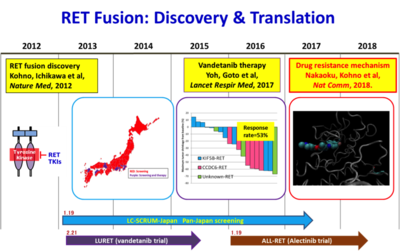Authors
Takashi Nakaoku, Takashi Kohno, Mitsugu Araki, Seiji Niho, Rakhee Chauhan, phillip P.Knowles, Katsuya Tsuchihara, Shingo Matsumoto, Yoko Shimada, Sachiyo Mimaki, Genichiro Ishii, Hitoshi Ichikawa, Satoru Nagatoishi, Kouhei Tsumoto, Yasushi Okuno, Kiyotaka Yoh, Neil Q.mcDonald, Koichi Goto
Abstract
TOKYO, Japan (February 14, 2018) –The National Cancer Center, Kyoto University, RIKEN, the Francis Crick Institute and other institutions today announced elucidation of a novel mechanism underlying acquired resistance to RET tyrosine kinase inhibitor (TKI) in lung cancer.
Lung adenocarcinoma is the most common type of lung cancer worldwide, with incidence and mortality rates increasing in both Asian and Western countries. Oncogenic fusions of the RET kinase gene are present in 1‒2% of LADCs. RET fusion is a target for the treatment using clinically active RET tyrosine kinase inhibitors (TKIs) such as vandetanib. However, the mechanisms underlying acquired resistance to RET TKIs in lung cancer patients had been unknown.

Press Release: PDF file
Nature Communications: https://www.nature.com/articles/s41467-018-02994-7
National Cancer Center Japan: https://www.ncc.go.jp/en/information/press_release/20180214/index.html